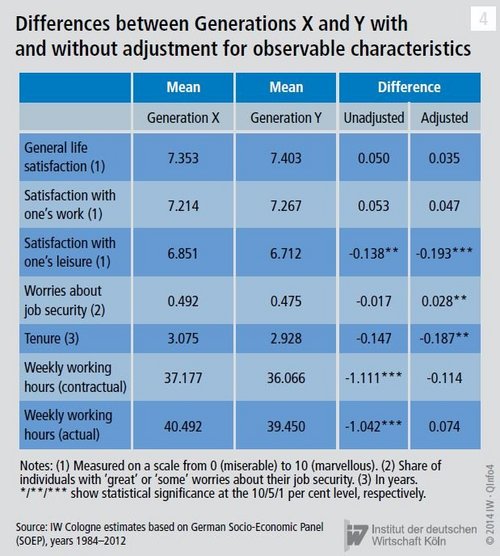Generation Y does not differ as much from older generations as media coverage often suggests. Rather, underlying societal trends play a critical role in explaining differences between the generations in the labour market.

Same, same but different?
According to mainstream media coverage, members of Generation Y – a.k.a. ‘millennials’ – differ from former generations in many ways: they are supposed to be tech-savvy, non-location dependent CV-optimisers looking for meaningful occupations that offer both maximum flexibility and security (i.e. an optimal work–life balance).
However, empirical evidence supporting the idea that Generation Y differs from former generations is scarce or lacks methodological and statistical rigour. Many studies claiming differences between, say, Generation X (birth cohort 1965–1979) and Generation Y (birth cohort 1980–1995) rely on a negligible number of observations or are confined to specific groups, e.g. students.
Other surveys, while being supported by more observations in different population groups, compare Generations X and Y at the same point in time. By doing this, they confuse the effect of ‘generation’, i.e. the affiliation with certain birth cohorts, with the effect of age: by definition, today’s members of Generation X are on average 15 years older than their millennial counterparts.
To address these empirical issues and to shed light on the (alleged) differences between millennials and members of Generation X, researchers at IW Cologne have analysed data for employed individuals aged 18–32 over the last 28 years. The results of their assessment are that generational differences are marginal at best.
While raw group differences, e.g. differences in the mean averages between Generations X and Y, do indeed occur along a number of indicators such as general life satisfaction, satisfaction with work/leisure, or weekly working hours, these differences are small and can often be explained by group differences in observable characteristics such as gender distribution, family structure, or the ratio between full-time and part-time employed individuals in both generations (see table ‘Differences between Generation X and Generation Y’).
Given these small generational differences, the proclaimed mantra that millennials are somewhat ‘exceptional’ may need to be reversed, if not rewritten entirely. Yes, the ‘newer’ generation shows slightly different outcomes from the ‘older’ one. However, this result can largely be attributed to the effect of underlying societal trends such as changing demographics, more women in the labour force, and an increase in the share of higher formal degrees. Hence, rather than being a different generation as defined by birth cohorts, millennials differ from members of Generation X because of other, more profound factors.
The researchers at IW Cologne thus emphasise the importance for human resources to keep an eye (or two) on the big, underlying trends transforming our society instead of singling out specific generations on which trendy buzzwords are projected. ‘Generations’ per se don’t seem so different after all – continuous adaptation to changes affecting all personnel is the way to go for HR.
More on the topic

Leadership in transformation: Megatrends and management as a driver of change
Leadership dynamics in companies are subject to constant change in order to meet the challenges of their time. Today, the greatest influences result from developments such as demographic change, globalization, individualization, structural change and ...
IW
Orphaned executive chairs in German companies
In 2023, half of the companies in Germany reported increasing problems in filling vacancies for management positions because employees are not aiming for a career. Larger companies are less affected than small companies.
IW